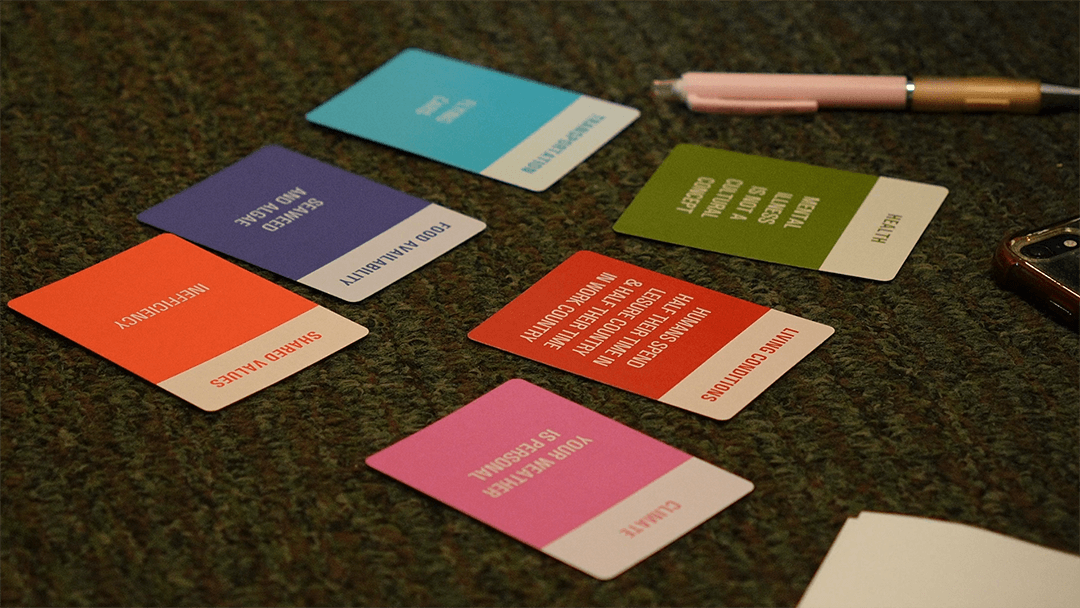The hallways of Rice University’s Herring Hall buzzed with conversation as students considered the challenges laid out before them.
“What are we going to eat?”
“They need a way to collect algae.”
“Ski lifts. They’ll use ski lifts for transport.”
The students arranged in clusters on the first floor were deep in discussion about the world they were creating through the card game More&More.
“More&More is about engaging anyone in feeling active and present in imagining the world or the future,” said acclaimed interactive media artist Sarah Rothberg, who along with fellow media artist Marina Zurkow developed the game to help players break free from conventional patterns of thought and envision new possibilities.
“Interestingly enough, that’s what this project activates,” Zurkow said. “It cultivates stakeholders and players to exercise their active imagination and bring some of that back to the present.”
The premise of More&More is simple. Players draw six cards from different categories then select a role card, such as an artist, child, pet, religious leader or architect.
“You play together, you make a provisional world your little group can agree on,” Zurkow said. “Then you inhabit a role. You explore that yourself. You might uncover problems or new details. You come back together. You tell the story of your world, hopefully to other groups doing something in parallel.”
This collaborative and reflective process, known as backcasting, allows players to envision a desired future then work backward to identify steps to achieve it. Joseph Campana, the William Shakespeare Professor of English and director of Rice’s Center for Environmental Studies (CES), often uses the game as a pedagogical tool in his classes.
“It really helps cultivate a critical imagination for the future,” Campana said. “In fact, it has been one of the students’ favorite things — and for some of them, the absolute favorite thing.”
Campana learned about More&More then called Investing in Futures several years ago when he met Zurkow at her exhibition at Houston’s DiverseWorks Arts Space.
“We started talking about what it would mean to make it more accessible to many,” Campana said, explaining that thanks to support from CES and Princeton University’s Blue Lab, More&More is now available to play online as well. “From there, we started exploring some other expansions, the most recent of which is this version of the system focused on energy.”
Casey Williams, an environmental studies lecturer at Rice, worked closely with Zurkow, Rothberg and other scholars to develop the game’s energy deck. This expansion introduces challenging scenarios such as giant flywheels powering the grid and communal public kitchens and bathrooms.
“Energy has been a research focus of mine for several years,” Williams said. “I’ve been interested in thinking about ways to come up with new teaching tools that help people think more deeply and critically about energy. We wanted a game that would authorize players to be their own experts, to affirm the expertise and knowledge they already have about energy and bring that to the game. Secondly, we wanted to free players from this kind of defeating constraint placed on the imagination by their sense of what’s feasible or realistic.”
Zurkow and Rothberg also adapted the 155-card More&More workshop decks into smaller bicycle decks they called WHAT IF?, which allows for shorter, individual game play. That versatility allows the game’s valuable tools to be used for various contexts.
“It’s important that we are able to use it in our classrooms at Rice and elsewhere, but we also wanted to create it in a way that it would have use and applicability for people who work in policy, or for people who work in the industry, or for people who are part of environmental justice, energy justice organizations,” Williams said.
Williams and Campana agree that Rothberg and Zurkow’s vision has transformed a simple deck of cards into a powerful tool for inspiring creative and thoughtful solutions.
“We feel really grateful to get to collaborate with them to support the work,” Campana said.
Learn more about More&More here.

